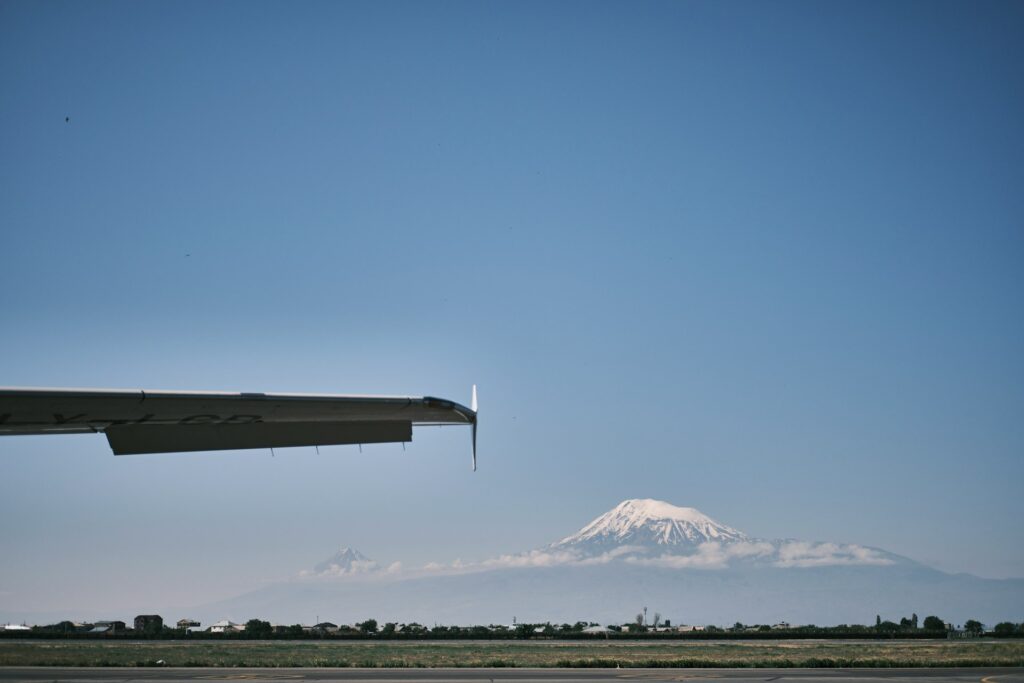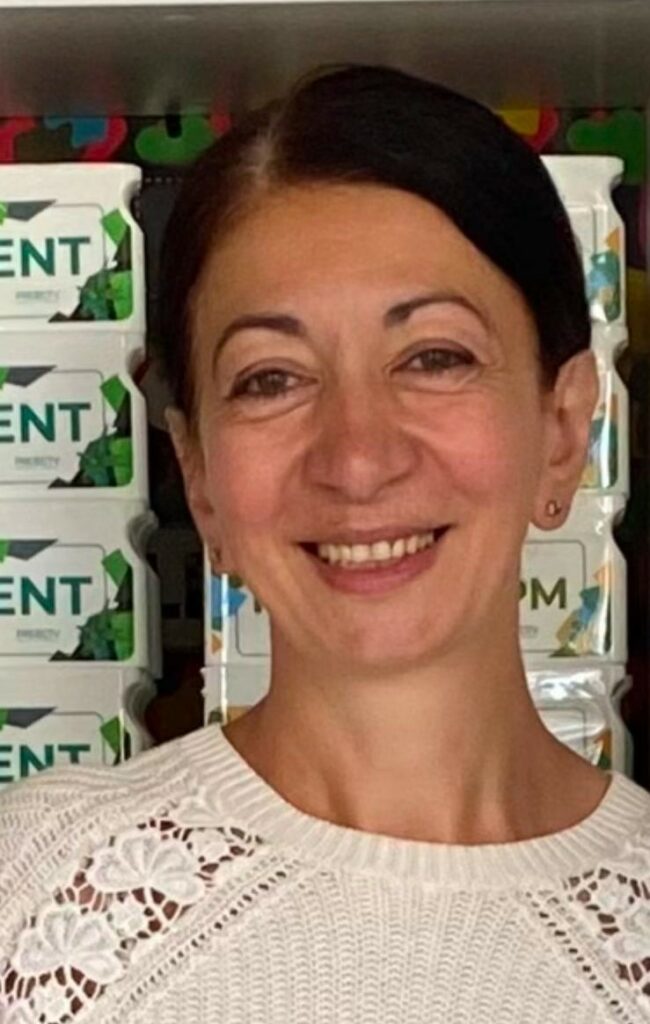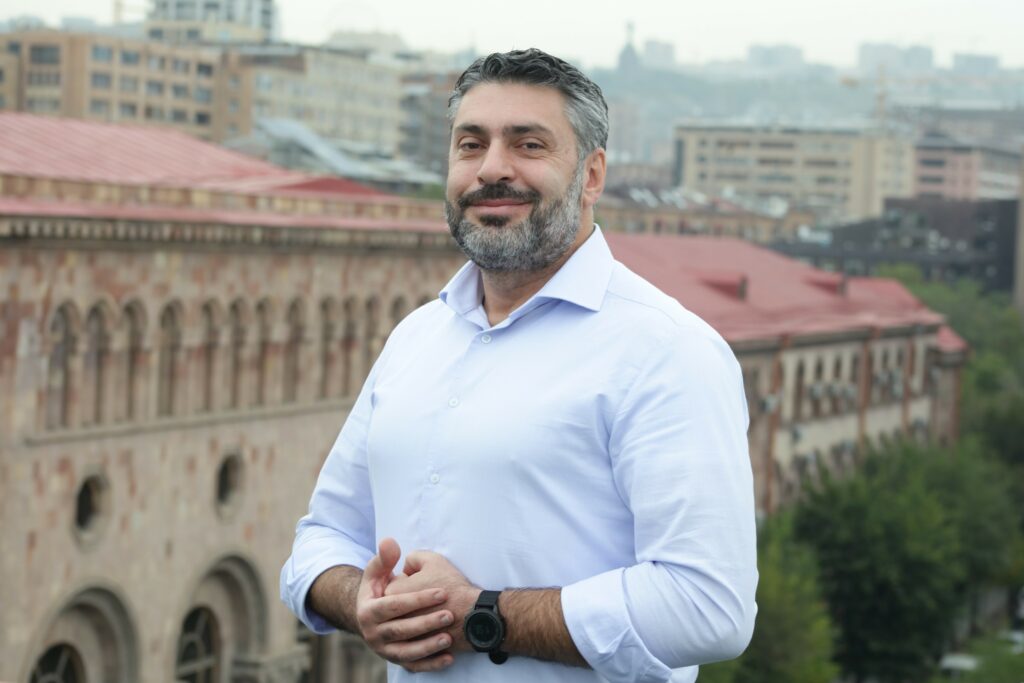by Lilia Becker
Amid challenges and opportunities, many Armenians choose to leave their country – not just out of financial need, but with the vision of returning one day. Armed with new experiences and knowledge, they aspire to give Armenia a stronger future.

Anna knows every corner and alleyway in Yerevan. After all, she has spent her whole life here. She grew up here, went to school and studied English language and literature. The 27-year-old currently works in fundraising for a foundation. Yet, she wants to leave Armenia.
“One of my biggest dreams is to live and study in London. I’ve simply fallen in love with this dream.” Alongside England, Germany is also on Anna’s wish list. A friend currently studying in Bielefeld, in West Germany, has inspired her to follow a similar path.
At first glance, her decision may sound contradictory. But Anna’s desire to leave is fueled by deep love for her home country.
“I want to go abroad for a while to get a good education, experience new things and try myself out. Then I’ll return and see what I am capable of achieving here, in my homeland. Armenia is my birthplace, and I feel a strong bond to the country. My family, my friends and countless cherished memories are here.”
What drives young Armenians to leave their country? While official statistics on emigration is extremely sparse, the figures available show a significant trend: around 300,000 Armenians—about 10 per cent of the population—have left in the last 10 years. The trend seems particularly relevant for young people, as in 2022 alone, one in five emigrants who left were between the ages of 15 and 29. Economic reasons and lack of career prospects are mainly behind this choice.
Responsibility out of love
It was the same for Gayane Apinyan around 30 years ago. She was in her early 20s when she left Armenia to pursue her career abroad. Among other things, she worked as a management consultant in Berlin and spent 26 years in the German capital. But the 44-Day War between Armenia and Azerbaijan in 2020 was a turning point for her: “I had the feeling that my country was in ruins, psychologically speaking. And my sense of responsibility towards the country I was born in was greater than towards the place where I had built a life.”

For Gayane Apinyan, the war in 2020 was ‘zero hour’ for Armenia. And suddenly, she explains, an inner drive led her to leave Berlin and move to Yerevan. “This responsibility is rooted in my love for my home country. And precisely because Armenia appeared in such a difficult situation, I felt it was my duty to be here and give people hope and confidence through my example. I wanted people to know that life goes on and show them that individuals from highly prosperous and peaceful countries choose to come here – just like me from Germany. I wanted to spread my optimism to those around me.”
Today, Gayane Apinyan is in her mid-40s and sees it as her task to empower Armenian youth to take an active role in shaping their country’s future. That is why she established an education center for children in Yerevan in the summer of 2024. The center mainly employs displaced persons from Nagorno-Karabakh who not only teach various subjects and chess to Armenia’s younger generation but also instill the values they hold dear.
“Even the smallest steps are important”
A study published by the Friedrich Ebert Foundation in 2023 shows that Armenia’s youth are more concerned about conflicts with neighboring countries than socio-economic issues such as unemployment and financial stability.
Anna also feels that something has changed with the 2020 war and the subsequent loss of Nagorno-Karabakh in 2023. “I think everyone hopes that they can also make a small contribution to the country’s development. We are all so sensitive to the loss we have suffered. And yes, even the smallest steps are important for the progress, improvement and strengthening of our country.”
Armenia’s population shrank between 1995 and 2020, but since 2022, things have changed. One of the factors contributing to this shift and rise in population figures is the influx of people from Russia, who, in turn, left their homeland following the Russian attack on Ukraine. In addition, most of the displaced persons from Nagorno-Karabakh now live in Armenia. To this day, however, there is no peace agreement with Azerbaijan. Relations with Turkey are not easy either, with the Armenian-Turkish border closed. While everyday life goes as usual, the political situation in the region remains quite tense.
All the more reason to tackle the demographic problem, says Vartan Marashlyan, the Director of Repat Armenia Foundation. “First of all, it is extremely important for a country whose very existence is under threat to be demographically, economically, socially and politically developed.”

Around 2.8 million people officially live in Armenia, while nearly twice as many Armenians reside outside Armenia in over 100 countries. “Our diaspora communities began forming a long time ago, and not just as a result of Genocide,” explains Marashlyan, highlighting that the first communities already existed in the early Middle Ages. “We are one of the classic diaspora nations, like Greeks or Jews,” he states. Nonetheless, despite this rich diaspora history, Armenia still needs “people, knowledge and skills.”
Diaspora Armenians as a key resource
Vartan Marashlyan himself has lived abroad for a large part of his life and sees great potential in the Armenian diaspora to contribute to the development of his homeland. This belief led him to found Repat Armenia almost 13 years ago together with 11 other like-minded campaigners. The organization’s mission is to help Armenians living abroad who wish to move to Armenia, ensuring they can gain a foothold in their country of birth or their ancestors’ homeland. Repat Armenia, among other things, supports these repatriates with formalities, offering language courses and facilitating networking. The activities of the organization are financed by H. Hovnanian Family Foundation, a philanthropic entity created by a prominent American-Armenian family.
According to Repat Armenia, 800 to 1,000 diaspora Armenians contact the organization every year asking for support with their plans. Most of them are between the ages of 25 and 40. “The number of repatriates might not seem that large for the country, but we can see that they are making a big difference in many areas,” says Vartan Marashlyan proudly. “Today, if you take a closer look at sectors like education, high-tech industry, wineries, bed-and-breakfasts, hospitality in general and numerous other areas, you will see that repatriates are becoming pioneers. They connect Armenia to a larger world, bringing with them the knowledge and skills they were able to cultivate abroad to create new opportunities here. This makes repatriation so important.”
“Whatever happens, it’s your country”
The reasons Armenians leave their homeland are often rational, while their reasons for returning have an emotional component. Anna’s reasons for leaving are also grounded in pragmatism, yet her determination to return to Armenia is unwavering. And not despite, but because she knows that Armenia still has much work to do to become, in her words, truly “independent” and “strong”.
“Whatever happens, it’s your country. And if you want to make a difference here, you should come back,” says Anna calmly and firmly. “Every time the overall situation exhausts you, and you think to yourself, ‘I could just go somewhere else and live a normal life,’ but then you remember – this is where you’re from. Every time I’m abroad, I feel it deeply: having your own country, your own culture, your own language is something irreplaceable. Yes, it’s important to have it and preserve it.”
This article was published within the frames of “Correspondents in Conflict” Project,
implemented by Yerevan Press Club and Deutsche Gesellschaft e. V. The Project is
funded by the German Federal Foreign Office within the “Eastern Partnership Program”.
The contents of this article are the sole responsibility of the implementing partners and can in
no way be taken to reflect the views of the Federal Foreign Office. #civilsocietycooperation
 Lilia Becker recently finished her traineeship at Westdeutscher Rundfunkt and now works as a freelance author and editor. In her work she focuses on post-Soviet communities in Germany and religion. Before working as a journalist, she trained as a medical assistant and worked in the profession for several years. Lilia then completed her A-levels and studied art history in Berlin and St Petersburg. Her studies focuses on art politics under dictatorship.
Lilia Becker recently finished her traineeship at Westdeutscher Rundfunkt and now works as a freelance author and editor. In her work she focuses on post-Soviet communities in Germany and religion. Before working as a journalist, she trained as a medical assistant and worked in the profession for several years. Lilia then completed her A-levels and studied art history in Berlin and St Petersburg. Her studies focuses on art politics under dictatorship.












